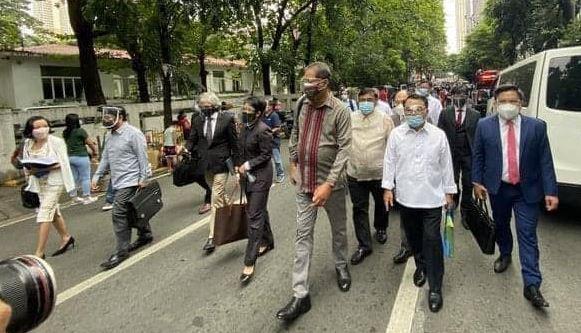Anti-terror law ‘hangs on fragile thread,’ says Lagman as SC ends Day 1 of oral arguments

As the Supreme Court concludes the first day of oral arguments on the Anti-Terrorism Act, one of the petitioners who spoke before the court affirmed the law stands on shaky ground because of its questionable provisions.
"The seven presenters on behalf of the 37 group of petitioners did well. Juxtaposed with the Bill of Rights, the ATA (Anti-Terrorism Act) hangs on a fragile thread," Albay Representative Edcel Lagman told GMA News Online.
Lagman was one of the seven presenters during the oral arguments together with Jose Anselmo Cadiz, Jose Manuel Diokno, Alfredo Molo, Evalyn Ursua, Neri Colmenares and Algamar Latiph.
At least 37 petitions were filed before the high court assailing the Republic Act No. 11479, making it one of the most challenged Philippine legislation.
There are six clustered issues in today's oral arguments before the Supreme Court (SC) on the petitions assailing the constitutionality of R.A. No. 11479 or The Anti-Terrorism Act of 2020.
In their opening statements, the seven lawyers argued that the law is void, challenging its definition of terrorism, its provision on warrantless arrests and the powers of the Anti-Terrorism Council.
Three justices were able to interpellate and ask about the definition of terrorism, on punishing intent, on freezing of accounts, and on surveillance among others.
During the interpellations, Associate Justice Rosmari Carandang asked Colmenares if surveillance was a legitimate intrusion for public safety.
Colmenares said while they understood the importance of going after criminals, the anti-terror law violated the due process as it allows extended surveillance on the basis of intentions.
Carandang, however, said the order of surveillance must still be authorized by the Court of Appeals upon application.
“So there are safeguards. In fact, the test is probable cause for the Court of Appeals to issue an order of surveillance,” Carandang said.
Colmenares, meanwhile, said it is an ex parte application.
“The relevance is that the basis of the court to issue an authorization is that an offense has been committed and the effects of the crime can be found in the place to be searched. How can the court know that an offense is to be committed?” he said.
“The definitions would not give standards on what probable cause is because nobody really knows the crime being committed or is about to be committed,” he added.
Oral arguments will resume at 2 p.m. on Tuesday, February, 9.
Solicitor General Jose Calida, who represents the government, is yet to argue before the high court.—LDF, GMA News



